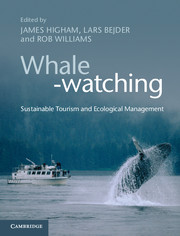Book contents
- Frontmatter
- Dedication
- Contents
- Acknowledgements
- List of contributors
- List of abbreviations
- 1 Tourism, cetaceans and sustainable development
- Part I The historical and contemporary contexts
- 2 Threats facing cetacean populations
- 3 From exploitation to adoration
- 4 Human attitudes and values
- 5 The whale-watching industry
- 6 The International Whaling Commission (IWC) and whale-watching
- Part II Human dimensions of whale-watching
- Part III Ecological dimensions of whale-watching
- Part IV Sustainable management: insights and issues
- Index
- Plate Section
- References
4 - Human attitudes and values
Tradition and transformation and zombies
from Part I - The historical and contemporary contexts
Published online by Cambridge University Press: 05 April 2014
- Frontmatter
- Dedication
- Contents
- Acknowledgements
- List of contributors
- List of abbreviations
- 1 Tourism, cetaceans and sustainable development
- Part I The historical and contemporary contexts
- 2 Threats facing cetacean populations
- 3 From exploitation to adoration
- 4 Human attitudes and values
- 5 The whale-watching industry
- 6 The International Whaling Commission (IWC) and whale-watching
- Part II Human dimensions of whale-watching
- Part III Ecological dimensions of whale-watching
- Part IV Sustainable management: insights and issues
- Index
- Plate Section
- References
Summary
Introduction
Tradition is commonly cited in arguments justifying the continuation of commercial whaling (e.g. Morishita, 2006). Rather than explore the meaning and context of whaling traditions, I shall focus on the more general question of how we perceive animals, and what those perceptions mean for how people relate to animals. Then I shall describe the recent transformations in those who support whaling, and those who oppose it, focusing on whale-watching. Finally, I question whether the non-government organization (NGO) support for whale-watching as a replacement for whaling has become, itself, a tradition that has morphed into a zombie.
Zombies may seem an odd addition to the discussion of the role of nature-based tourism in conservation, but here, I discuss a zombie idea, rather than the shambling undead. Recently, the construct of ‘zombie’ ideas has been introduced (Quiggin, 2010) in macroeconomics. A zombie idea is one that should have been killed off long ago, given available evidence that it is wrong, and yet it just will not die. Although the impetus for zombie concepts came from macroeconomics (Quiggin, 2010), the construct has been taken up by authors in other areas: for example, military history (Stockings, 2010), environmental economics (Reyes, 2011) and ecology (Fox, 2011).
Information
- Type
- Chapter
- Information
- Whale-watchingSustainable Tourism and Ecological Management, pp. 48 - 56Publisher: Cambridge University PressPrint publication year: 2014
